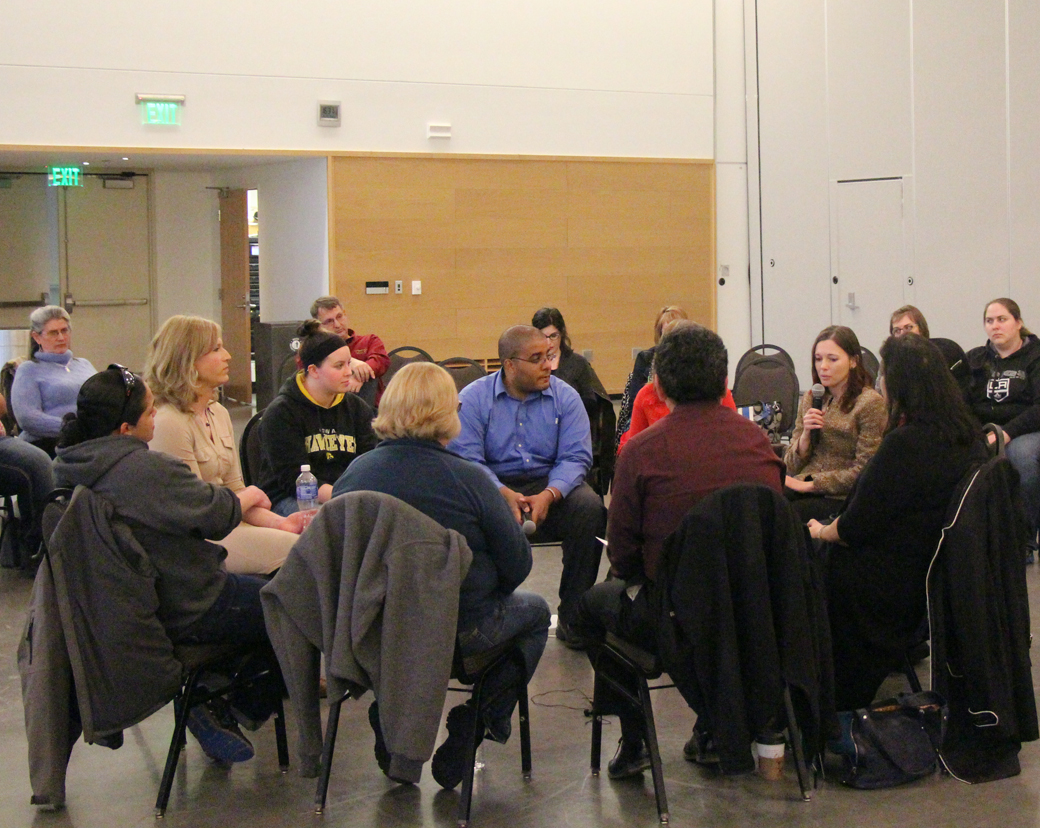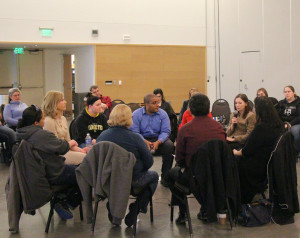
Bitch magazine editor talks ‘making media instead of hating media’ at Diversity Symposium
The 1995 Vanity Fair Hollywood issue is a cover Andi Zeisler, editor of “Bitch: Feminist Response to Pop Culture,” is quick to point out. Beautiful women, scantily clad in suggestive poses — with little indication these women are a success for not just their looks but for their acting chops.
“This cover is saying, ‘Women are only as valuable as they are beautiful,’ ” Zeisler said.
It was this image that inspired Zeisler to start Bitch Media, a nonprofit best known for starting the “Bitch” magazine, a quarterly publication.
Since 1996, “Bitch” magazine has published critical essays that analyze and provide commentary on TV, film, music, advertising and more. With a readership of 80,000, it is one of few publications available that mix reported pieces, reviews and interviews surrounding contemporary feminism discourse.
In her keynote presentation at the University of South Dakota’s Diversity Symposium Thursday, entitled “Don’t Just Change the Channel: Why Pop Culture Matters to Feminism, Activism and Social Justice,” Zeisler addressed how media and pop culture are inescapable.
It is a matter of ‘not hating the media, but making the media’ to present women as they are, three dimensional beings, she said at the event that was first started three years ago by Tiospaye, USD’s Native American Student Council.
Zeisler is the cofounder of Bitch Media, the author of “Feminism and Pop Culture” and the coeditor of “BitchFest: Ten years of Cultural Criticism from the Pages of Bitch Magazine.” Her work has also been featured in numerous newspapers and magazines, including Mother Jones, the San Francisco Chronicle and the Washington Post.
“People think (Bitch Magazine) is about man bashing, and it’s something ugly — but it’s not,” Zeisler.
Just “turning the channel” when someone witnesses sexism in pop culture is not the answer, she said. It is the sexualization of girls with dolls like scantily-clad Bratz that need to be talked about. People instead need to capitalize, because these are the “opportunities to make media and pop culture a better, more diverse world are all around us.”
“Feminism’s image problem was something we wanted to up-end (with Bitch magazine),” Zeisler said.
An issue college campuses — and society — are facing centers around intergroup communication about terms that are used to describe different communities, and the negative, oppressive and contentious association with words like queer and bitch.
“One strategy for dealing with negative terms is to re-appropriate them and make them empower rather than injure,” Sternadori said.
Zeisler’s keynote presentation included on her experience with the re-appropriation of the use of “the B-word.” If being an outspoken woman means being a bitch, Zeisler said she takes that as a compliment, and while some people are offended by its use, she and her coworkers choose to reappropriate the word. It is a matter of getting people to think about what they are saying when they use the word.
“Our use of bitch is about speaking up and being a worthwhile part of activism,” she said.
Junior Todd Stephens asked Zeisler what she thought of the highly acclaimed Disney film “Frozen,” and its impact on young girls. She said she took her five-year-old to the movie, and its success is heartening because of its female leads vying for the love between sisters, not a possible suitor.
Stephens said he was impressed by how well-versed Zeisler was on pop culture’s reflection of feminism, and felt a positive response from the way she addressed her keynote to the audience.
“It wasn’t just like, ‘This is what men are doing wrong, this is how they are oppressing women.’ (Zeisler) made the point of saying the work she is doing at Bitch Magazine is about helping society, not just women,” Stephens said.



